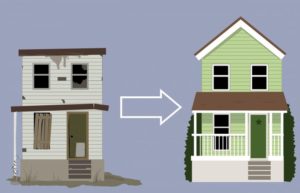
Image from www.thinkrealty.com
Must you Pay Self-Employment Tax on Real Estate Flips?
If you buy houses to fix and flip, you may be on the hook for self-employment taxes. In other words, you might have to pay 15.3% of your income toward Social Security and Medicare taxes in addition to your ordinary tax rate.
Why would you pay self-employment tax on real estate flips?
If you buy properties to fix and sell right away, you’re actively making money on the properties and they’re subject to the self-employment tax. But, if you buy properties, fix them and hold onto them, it can be a more passive approach rather than a business, which means no self-employment tax.
While it’s not as cut and dry as that, it’s the basic idea.
How will you Use the Property?
Whether you must pay self-employment tax on your fix and flips depends on how you plan to use the property.
If it’s evident that you’re using it to make an active profit, you’ll pay self-employment tax. You aren’t buying the property to enjoy its appreciation over time – you are making a quick profit, which is subject to self-employment tax.
Getting Around the Self-Employment Tax
While it would be great to avoid the self-employment tax altogether, it’s not possible. What you can do, though, is set up an S Corp. With an S Corp, you pay yourself a salary and you take the remaining income as dividends.
You’ll still pay self-employment tax on the salary, but the dividends are only subject to capital gains taxes, which are much lower than self-employment tax.
You must be careful, though. Your salary must be reasonable and customary for the area. You can’t ‘cheat the system,’ so to speak.
How to Prove you aren’t a ‘Flipper’
If you don’t want to pay self-employment taxes, you must prove beyond a reasonable doubt that you’re flipping houses.
If you rent the properties out, you show that you aren’t in it for a quick profit, but rather a long-term, passive investment. This means you must prove you don’t have an ‘inventory’ of houses, but rather a portfolio that you plan to keep for the long term.
Which is Better?
There’s no right or wrong way to invest in fix and flip properties. You have options to get around the self-employment tax. While you might not avoid it altogether, you might be able to lower it so that you don’t pay so much to Uncle Sam.
To make the most of your investment in real estate, it’s best to work with a licensed professional like myself. Let’s connect, talk about your business and decide which business model suits you the most so that you can keep your tax liabilities as low as possible.
